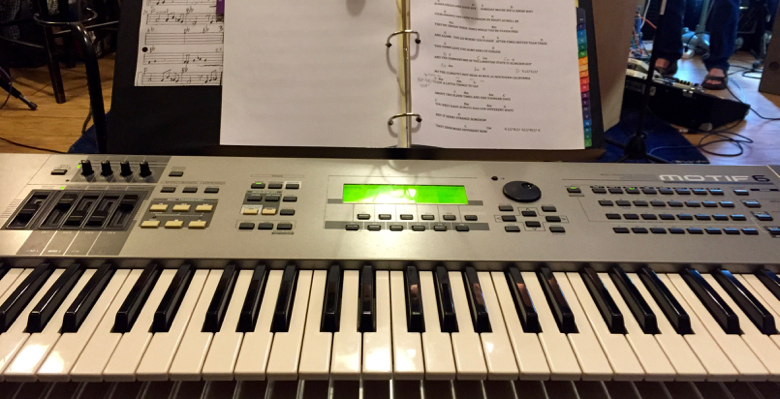Detail-Oriented Is Overrated
 My keyboard during a recording session last summer. I owe my meager keyboard abilities to the strategy in this article.
My keyboard during a recording session last summer. I owe my meager keyboard abilities to the strategy in this article.
Two questions for you, fair reader:
- Do you consider yourself detail-oriented?
- Do you often abandon new projects too early?
I’ve struggled with this in the past: learning the guitar, learning to cook, even my first attempt at blogging. I made progress in all three areas, and the projects were still worthwhile. In the end, though, they all fizzled too early.
But I’ve turned a corner. I’m sticking with more projects these days, and I think I’ve figured out why.
Don’t Blame Burnout
I used to think that burnout was to blame. Sometimes we just get tired of things, right?
It’s not burnout, at least not most of the time. Here’s my theory about why we detail-oriented folks often quit learning new skills:
We get so bogged down in the details that it’s easier to quit than to make 100 little decisions about the best route forward.
This happens everywhere in our lives:
- Hobbies: “Should I water my new garden in the morning or at night?”
- Exercise: “What kind of protein powder should I put in my post-workout shake?”
- Learning a new language: “Which is better: Rosetta Stone or Duolingo?”
It’s not that we’re tired of gardening, exercising, or learning Japanese. We’re tired of dealing with all the decisions.
And the thing is, most of them don’t matter anyway. Here’s what matters more.
Log Lots of Hours
If I stay with [the banjo], then one day I will have been playing for forty years, and anyone who sticks with something for forty years will be pretty good at it. — Steve Martin (yes, that Steve Martin)
An unconventional strategy:
When learning a new skill: first focus on logging lots of hours. Later, focus on specific strategies.
Or, to put it more succinctly:
Just doing something a lot will get you pretty far.
Here are two examples.
The Accidental Keyboard Player.
I play keyboard with a band. Like, a real band. We have gigs and albums and stuff.
I’m a trumpet player. The only keyboard training I have is 3.5 years of piano lessons in grade school. (I broke my collarbone in 7th grade and finally got to quit. Woo!)
When I started playing keyboard with Deadwood in 2013, I was awful. Seriously bad. So I practiced 30 minutes every morning for 6 months. That helped a lot.
But what’s helped even more is the hundreds of hours I’ve now spent rehearsing and performing on the keyboard. If I know what I’m doing even a little bit, it’s because I’ve logged lots of hours.
Super Advanced Blogging Advice
I love blogging, but it’s hard.
There are so many details to attend to:
- Is my topic narrow enough?
- Who’s my ideal reader?
- How much does SEO matter?
- Should I write in a text editor or directly in Wordpress?
- What’s CDN? Should I bother with it?
There are many, many more. It’s easy to lose sight of my two most important strategies:
- Set public deadlines (Tuesday and Friday)
- Park my butt in a chair and write.
These two things have made me a better writer, not obsessing over pageviews and clicks.
Details Become Important Much Later
An important caveat: mastery requires confronting the details.
If you want to be a world-class bowler, you need the perfect bowling ball.
If you’re going to be the next Stanley Drucker, you’re going to have all the details worked out for the famous clarinet solo in Beethoven’s sixth symphony.
But for many activities, mastery is not the goal. Competence is. And if you’re only bowling twice a week or missing practice days because you can’t decide on the perfect practice routine, you might focus on logging hours for a while.
If you’re struggling to stick with a project, try shifting your focus from doing it perfectly to doing it a lot.
The details can wait.